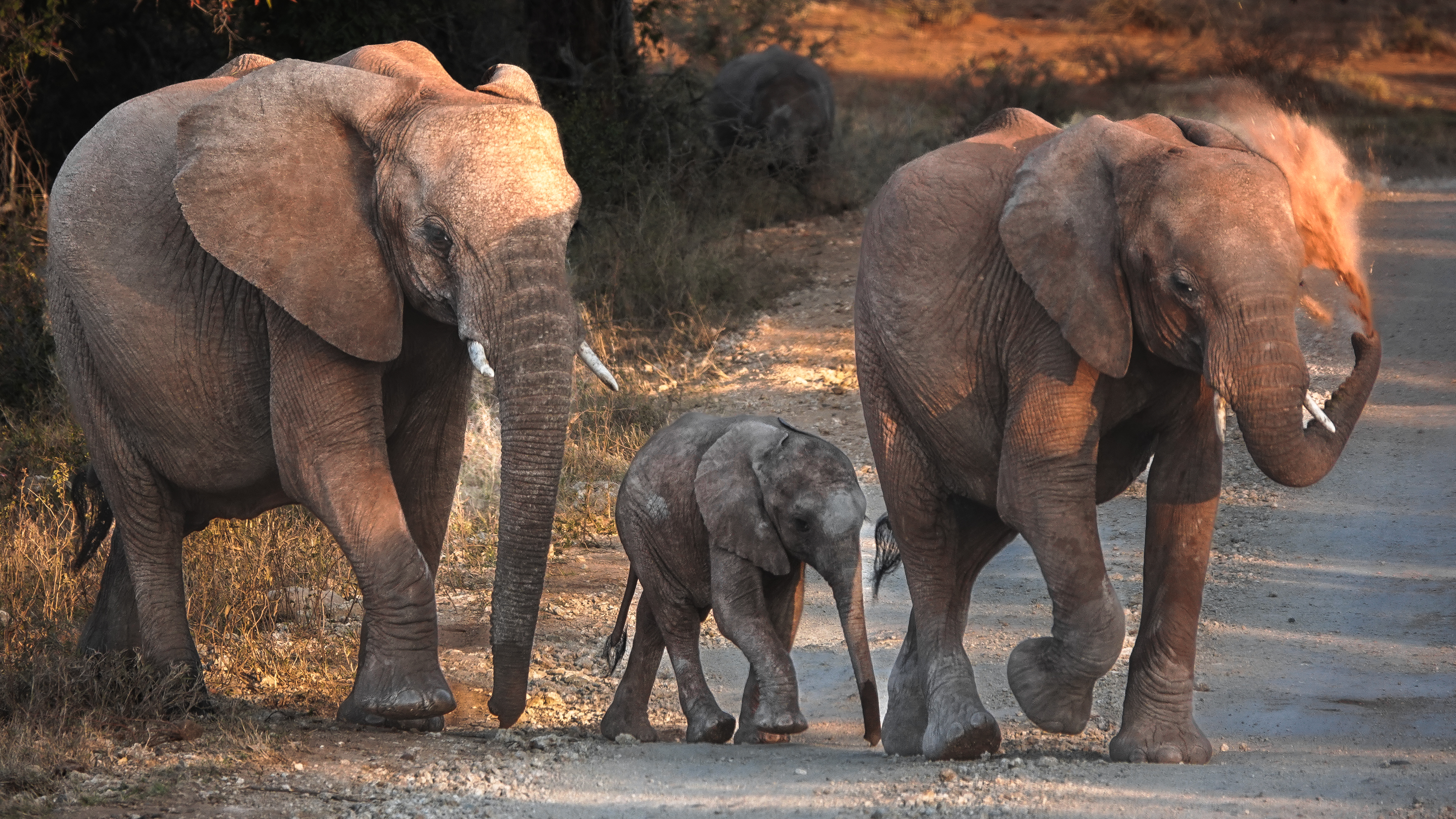In a blistering parliamentary session last week (18 September), members of the Portfolio Committee on Forestry, Fisheries and the Environment accused North West officials of gross mismanagement, evasion of responsibility and defiance of parliamentary directives over the state of elephants in Madikwe Game Reserve.
What should have been a clear-eyed reckoning turned into what one MP called “an exercise in obfuscation”, with provincial officials failing to answer key questions, provide overdue reports, include stakeholders or present a credible plan for elephants in the 75,000-hectare reserve.
“Madikwe is being treated like an elephant farm,” said DA MP Andrew de Blocq, lambasting the North West Parks and Tourism Board (NWPTB) for its “blatant disregard” of Parliament’s instructions and its refusal to even consider non-lethal solutions such as contraception. “This is not an administrative oversight,” he told the committee, “but a deliberate act of defiance against the authority of the committee and Parliament itself.” He called on the chair to report North West officials to the Speaker of the National Assembly for a violation of Parliamentary rules.
In question is whether a crisis is being manufactured in order to call in hunters using a natural die-off as a result of drought. At a recent stakeholder meeting in Pretoria, SANParks big-mammal specialist Dr Sam Ferreira disputed the notion that Madikwe had reached a population crisis, noting that “carrying capacity” is not a fixed number but a fluid concept shaped by rainfall, vegetation, management goals and tolerance for habitat change. Ferreira suggested that Madikwe’s population could stabilise or even decrease naturally without lethal intervention.
“The elephant population did not explode overnight,” NSPCA Wildlife Protection Unit manager Douglas Wolhuter told Parliament. “These animals breed slowly. Every warning sign was ignored.” In a news release the society called it a “manufactured crisis”.
/file/dailymaverick/wp-content/uploads/2025/06/Madikwe-Parly3.jpg)
Repeated offers of free immunocontraception by Humane World for Animals – in 1998, 2020 and again in 2023 – were ignored by NWPTB without explanation, despite there being a signed memorandum of understanding between the parties and budget available from Humane World Africa.
The NSPCA itself, despite its legal mandate under the Animals Protection Act, was excluded from the provincial task team set up to address the crisis, in direct contravention of the portfolio committee’s explicit instruction that it be included and that minutes of all meetings be shared.
“The committee was clear that our inclusion was not up for discussion,” said Wolhuter. “Yet we remain locked out, unable to prepare or contribute meaningfully, even though these are sentient animals suffering because of years of mismanagement.”
Non-negotiables ignored
In June, the portfolio committee issued six non-negotiable directives to NWPTB and the provincial Department of Economic Development, Environment, Conservation and Tourism:
- Include the NSPCA in its task team;
- Share minutes;
- Submit an oversight site-visit report;
- Provide a management plan; and
- Respond formally to the NSPCA’s presentation, and report back to Parliament by 7 July 2025.
As De Blocq pointed out in last week’s session, “they have not managed to deliver on a single one”. Other MPs echoed his frustration.
North West Parks deflection
When NWPTB appeared before Parliament on Thursday, 18 September, after having been told its presentation was inadequate on 16 September, its presentation was widely condemned as evasive. The presentation focused on transformation issues and community benefit, but provided almost no detail on how it would stabilise the elephant population. It’s only “solution” was to hunt or cull.
/file/dailymaverick/wp-content/uploads/2025/09/192A1627_49405230186.jpg)
/file/dailymaverick/wp-content/uploads/2025/06/Madikwe-Parly5.jpg)
Acting CEO Jonathan Denga said the situation was dire but said little to inspire confidence. “Yes, the growing population was noticed… but we have to solve it now,” he said, adding that contraception and translocation would form part of a future “integrated approach” – but that culling “has to happen”.
MPs were unconvinced. “Trophy hunting is not a management tool,” De Blocq told the meeting. “It is an economic tool” – warning that NWPTB’s promotion of hunting as a solution raised questions about vested interests and revenue generation taking precedence over science and ethics.
Indeed, critics point to North West MEC for economic development, environment, conservation and tourism Bitsa Lenkopane’s official appearance at the Dallas Safari Club Convention in January, followed by tender bids for hunts in provincial reserves, as cause for suspicion.
Read more: Madikwe crisis — NSPCA and DA accuse North West Parks of trying to raise revenue on elephant misery
Reference to the injury of a single tourist as the only evidence of growing human / elephant conflict was completely unconvincing.
Overpopulation narrative questioned
The central justification for culling – that Madikwe has exceeded its “carrying capacity” – is also under challenge.
“The idea of a fixed “carrying capacity” comes from an outdated view of nature that assumed ecological balance was static. It is, however, not. Today, we understand that ecosystems operate more like a pendulum than a set of scales,” said long-time Madikwe expert Roger Collinson.
Read more: Killing without proof — the hidden motives behind Madikwe’s elephant cull plans
The NSPCA warned that “lethal reduction, whether in the form of culling or trophy hunting, cannot be repackaged as an income stream to plug holes in long-neglected management systems”.
/file/dailymaverick/wp-content/uploads/2025/09/WhatsApp-Image-2024-12-02-at-14.50.18-1.jpeg)
Tourism reputation at risk
The crisis also poses reputational and economic risks. Madikwe, marketed as “one of the best conservation areas in Africa”, is heavily reliant on photographic tourism. A May 2025 tender for the trophy hunting of 25 elephants, two black rhinos and 10 buffalo provoked outrage from tourism operators, who warned that such measures could damage the reserve’s brand and undermine non-lethal wildlife management strategies.
Read more: North West officials evade responsibility for Madikwe elephant crisis, say MPs
“This is a reputational nightmare,” one lodge operator told investigators anonymously. “Tourism partners were not even consulted.”
A parliamentary reckoning
Committee chair Nqabisa Gantsho has repeatedly stressed that the time for excuses is over. In her directive ahead of the 18 September meeting, she ordered that all outstanding reports, site visit findings and management plans be submitted in writing before the session – but they were not. This amounted to a provincial authority thumbing its nose at the national Parliament.
/file/dailymaverick/wp-content/uploads/2025/06/Madikwe-Parly2.jpg)
/file/dailymaverick/wp-content/uploads/2023/06/Madikwe-elephants-Declan-Hofmeyr.jpg)
Her closing remarks captured the mood of the committee: “We have seen suffering animals. We have seen death. We have seen degradation. The time for delays is over.”
The prevarication and defiant performance by North West Parks left many MPs with the impression that it was using this to delay a solid scientific study as guidance in order to go ahead with plans to hunt and cull.
No scientific studies have been provided by North West Parks to support any of their allegations of elephant overpopulation, environmental degradation or biodiversity loss. DM
Don’s view
Madikwe’s elephants are facing mass slaughter unless Parliament gets the political will to ensure a pivot towards humane, accountable and scientifically defensible management.
For now, the reserve remains in deadlock – and the eyes of the conservation world remain firmly fixed on North West.





 Elephants in the Madikwe Game Reserve in North West. (Photo: Declan Hofmeyr)
Elephants in the Madikwe Game Reserve in North West. (Photo: Declan Hofmeyr)